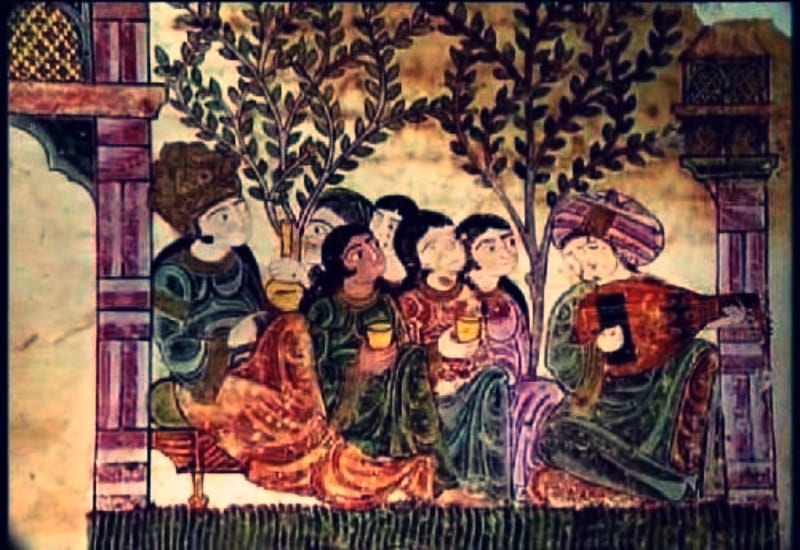
Goes this first section of this series dedicated to our Medieval literature. Yes, the one that one day we read in the texts of school books, which was so difficult for us to understand and sounded so strange. Well, I do a self-review exercise and I recover those jarchas and cantigas de amigo, whose highest representative was the Galician troubadour Martin Codax. In passing I remember a few chosen ones.
jarchas
These anonymous songs that appeared in the XI-XIII centuries they are verses generally love theme (There are also praise) that belonged to popular poetry. They were sung by the mozarabic (Christians who lived in the Muslim kingdoms of Al-Andalus). After the learned arab poets collected them to add to the end of their moaxajas (learned poems in Arabic language) as if they were a estribillo.
They are usually narrated by a female voice that expresses its feelings of love for a loved one who many times calls Habib ("Friend, lover" in Arabic). Y usually addresses his mother or sisters to ask or complain about the absence of that love.
Songs of friend
From the XNUMXth-XNUMXth centuries, the Galician-Portuguese cantigas de amigo share characteristics with the jarchas: they are also love songs with female voice who are heading to a "friend" (hence the denomination) of which they speak not only with their mother, sisters or friends, but also with nature elements (the waves, the sea or the trees).
And there are four types:
- Danced: of traditional origin, express joyíto love and live, and they invite you to dance.
- Marinas or barcarolas: cantigas that talk about the sea or in which the girl talks to the sea.
- Roman songsía (= romeríto): related to romeríace and pilgrimages to hermitages or sanctuaries, where lovers used to meet or date.
- Alba: they talk about the separationón of lovers at dawn.
The most famous composer and troubadour was the Galician Martin Codax, who composed seven Songs of Friend in the XNUMXth century.
What jarchas and cantigas also share is the symbolism and the simplicity of many elements such as those of nature, which sometimes have love or erotic values. These are some examples:
jarchas
What will I do or what will become of me,
oh my beloved,
do not get away from me
oh my beloved,
do not get away from me
***
So much loving, so much loving,
friend, so much love!
Shining eyes sickened
and they hurt so bad!
***
My sorrow is because of a violent man: if I go out
I'll see myself with ills
it does not let me move or I am recriminated.
Mother, tell me what will I do.
***
Tell me:
When my lord, oh friends,
will, by God,
give me your medicine?
***
Oh mother my friend
it leaves and does not come back!
Tell me what will I do, mother
if my sorrow does not ease.
***
My lord Ibrahim,
oh you sweet man
come to me
at night.
If not, if you don't want to,
I will go to you
tell me where
find you.
***
My heart leaves me
Oh God! Will it come back to me?
So bad (is) my strange pain
(how) sick is (my heart), when will it heal?
songs
By Martín Códax
Waves of the sea of Vigo
Waves of the sea of Vigo,
Did you see my friend?
Oh my God! Will it come soon?
Waves of the rough sea,
Did you see my beloved?
Oh my God! Will it come soon?
Did you see my friend
the one for whom I sigh?
Oh my God! Will it come soon?
Did you see my beloved,
who has me so worried?
Oh my God! Will it come soon?
***
Beautiful sister of mine
My beautiful sister, come with me
to the church of Vigo, where the rough sea is.
And we will watch the waves, my beautiful sister, come willingly
to the church of Vigo, where the sea is raging.
And we will look at the waves, at the church of Vigo, where the rough sea is,
there he will come, mother, my friend
And we will look at the waves, at the church of Vigo, where the angry sea is,
there he will come, mother, my beloved
And we will watch the waves.
to the church of Vigo, where the rough sea is.
And we will watch the waves, my beautiful sister, come willingly
to the church of Vigo, where the sea is raging.
And we will look at the waves, at the church of Vigo, where the rough sea is,
there he will come, mother, my friend
And we will look at the waves, at the church of Vigo, where the angry sea is,
there he will come, mother, my beloved
And we will watch the waves.